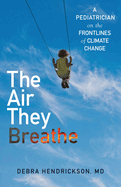
In The Air They Breathe, pediatrician Debra Hendrickson forcefully argues that rapidly ceasing the use of fossil fuels, transitioning to renewable energy, and rethinking norms of everyday life in terms of how people commute, how they eat, and even how they design technology is paramount to keeping children healthier. Hendrickson tracks the impacts on infant, child, and adolescent health, looking at respiratory health and susceptibility to an increased range of diseases, as well as being prone to suffer more acutely from extreme weather. Other impacts include negative consequences to children's mental health, such as climate anxiety and an inability to consider a thriving future, and post-traumatic stress disorder from surviving climate disasters such as severe storms, fires, and floods. In the light of her experiences as a medical professional, she insists that children are the proverbial canaries in the coal mine.
The stories Hendrickson relates about the experiences of her child and teenage patients are eye-opening and heart-wrenching; she details a fear faced the world over as families contend with challenges that feel impossible in an environment where policy change moves more slowly than the need for it. But most importantly, Hendrickson does not focus only on the negatives. She also highlights opportunities to build a better world for current and future children, making sure that there are paths forward for everyone. As Hendrickson says, "Surely our science will yield more than a chronicle of our end." The Air They Breathe is a necessary work for anyone looking to understand how climate action's long-term effects are even more expansive and vital to prioritize. --Michelle Anya Anjirbag, freelance reviewer

